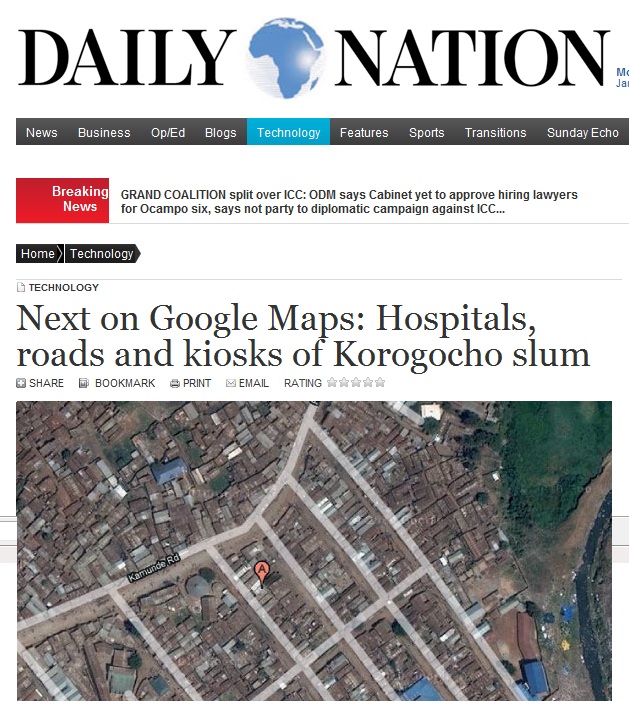FrontlineSMS is excited to announce that we have been awarded the Curry Stone Design Prize, a prestigious award which recognizes the valuable contributions of social design pioneers across the world. The award "was created in the belief that designers can be an instrumental force for improving people’s lives and the state of the world". The FrontlineSMS team is honoured to be recognised as one of the prize winners. According to Ken Banks, FrontlineSMS Founder:
We're honoured, surprised and excited to win this Prize, particularly when you consider most Curry Stone winners over the years have concentrated on physical design. This Prize, combined with our recent Buckminster Fuller Challenge "honourable mention" and last year's National Geographic "Explorer" award, see us taking FrontlineSMS - and the mobile-for-development sector in general - into new territory.
There's a growing realisation that socially-focused mobile tools can be part of the socially responsible design world, particularly if they are user-focused, and built around appropriate technologies which allow communities to build and design their own solutions to their own problems. This is an approach we have been championing for years, and it is wonderful to receive such recognition.
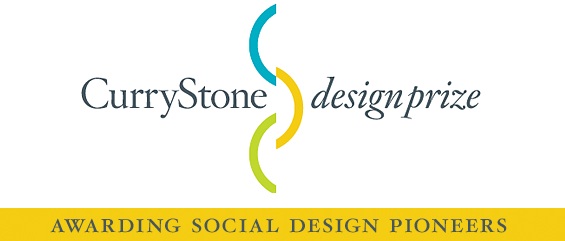 Warm congratulations to Hsieh Ying-Chun, the Grand Prize Winner, as well as Atelier d’Architecture Autogérée (AAA), also winners of the prize along with FrontlineSMS - we are honored to be recognized alongside them.
Warm congratulations to Hsieh Ying-Chun, the Grand Prize Winner, as well as Atelier d’Architecture Autogérée (AAA), also winners of the prize along with FrontlineSMS - we are honored to be recognized alongside them.
For further details about the Prize, and the other winners please see below press release, published today on the Curry Stone website:
The 2011 Curry Stone Design Prize Winners were announced today with an official presentation ceremony to follow on November 7th at the Harvard Graduate School of Design. Hsieh Ying-Chun is the Grand Prize Winner; he will receive $100,000 from the foundation with no strings attached. Hsieh is a leading Taiwanese architect who for over a decade has deployed his talents in rural areas decimated by natural disaster. Hsieh works throughout Asia, training villagers to build locally appropriate dwellings in response to devastation such as the 2008 Sichuan earthquake, the 1999 Nantou earthquake, and the 2009 Morakot typhoon in Taiwan. Through Hsieh’s hands-on education process, villagers reconstruct their own community foundation, knowing they will live in buildings with greater safety, structural integrity, and sustainability.
Two additional 2011 Winner Prizes, of $10,000 each, will be awarded to Atelier d’Architecture Autogérée (AAA) and FrontlineSMS.
Atelier d'Architecture Autogérée is a collective of architects, designers and social scientists who transform urban spaces through collaborative endeavors. Based in Paris and founded by Romanian architects Constatin Petcou and Doina Petrescu in 2001, AAA has become an engine for engaging citizens in shaping their own cities through building, farming, and artistic intervention. AAA acts as a creative instigator, empowering local communities to carry out and sustain their own ideas for urban regeneration.
FrontlineSMS was founded in London by Ken Banks in 2005 to enable effective communications channels for communities in the developing world. FrontlineSMS leverages the ubiquity of mobile phones and familiarity of text messaging to turn an offline laptop into a communication hub. The simple innovation empowers villagers, aid agencies, and news services to exchange information easily among groups.
The Curry Stone Design Prize was created to champion designers as a force for social change. Now in its fourth year, the Prize recognizes innovators who address critical issues involving clean air, food and water, shelter, health care, energy, education, social justice or peace. Nominees for the Curry Stone Design Prize are selected by an anonymous, rotating group of leaders representing broad fields of design, as well as humanitarian advocates from related disciplines. A jury reviews the nominations to choose one Grand Prize Winner and two Prize Winners. Emphasis is placed on emerging projects and ideas that may not have yet been taken to scale. The Curry Stone Design Prize was founded by Clifford Curry, an architect and recognized pioneer in senior housing, and Delight Stone, a historic archaeologist and social justice activist. Dr. Louisa Silva and Gary Feuerstein serve as board members.
Grand Prize Winner, Hsieh Ying-Chun establishes a cooperative network of designers, contractors, and residents that supports local needs. His simple designs ensure that every villager can have a hand in building their own home. His work has generated job opportunities and environmental awareness, while protecting local diversities and cultural traditions. After completion, he makes the design plans available in creative commons. Hsieh’s work has helped thousands of people. http://bit.ly/qH6FqA
Prize Winners:
Atelier d’Architecture Autogérée (AAA), Paris, France
Collective Urban Architecture
http://bit.ly/nnSbii
FrontlineSMS, London, England
Community Solutions Through Mobile Technology
http://bit.ly/qiXnQz
CURRY STONE DESIGN PRIZE FESTIVAL, Harvard Graduate School of Design
Prize Ceremony & Presentation: Monday, November 7th, 2011
6:30-8:00pm Harvard GSD, 48 Quincy Street, Cambridge, MA
RSVP events@currystonedesignprize.com
Three Workshops at the GSD: Tuesday, November 8th, 2011
12pm-2:00pm, CSDP Prize winners Hsieh Ying-Chun, Constantin Petcou and Doina Petrescu, and Ken Banks will each lead a workshop.
The Curry Stone Design Prize Festival is presented in partnership with the Loeb Fellowship and the Department of Urban Planning and Design, Harvard Graduate School of Design. For more information on the Curry Stone Design Prize, Events and Winners, see: www.currystonedesignprize.com or Twitter @currystoneprize.
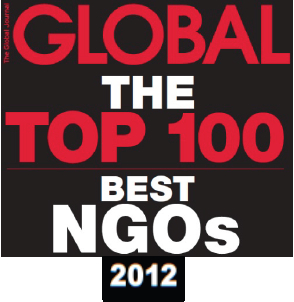 FrontlineSMS is excited and honoured to be featured in The Global Journal's list of Top 100 Best NGOs, which was announced earlier this week. It is fantastic to receive this acknowledgement for the important role FrontlineSMS is playing in leveraging mobile technology to support social change across the world. We have lots planned for 2012, and so this announcement is a great start to what is going to be a big year! For more information on this announcement please see below or you can visit the Global Journal webpage, too.
Here is how the Global Journal announced their 'Top 100 Best NGOs' list:
FrontlineSMS is excited and honoured to be featured in The Global Journal's list of Top 100 Best NGOs, which was announced earlier this week. It is fantastic to receive this acknowledgement for the important role FrontlineSMS is playing in leveraging mobile technology to support social change across the world. We have lots planned for 2012, and so this announcement is a great start to what is going to be a big year! For more information on this announcement please see below or you can visit the Global Journal webpage, too.
Here is how the Global Journal announced their 'Top 100 Best NGOs' list: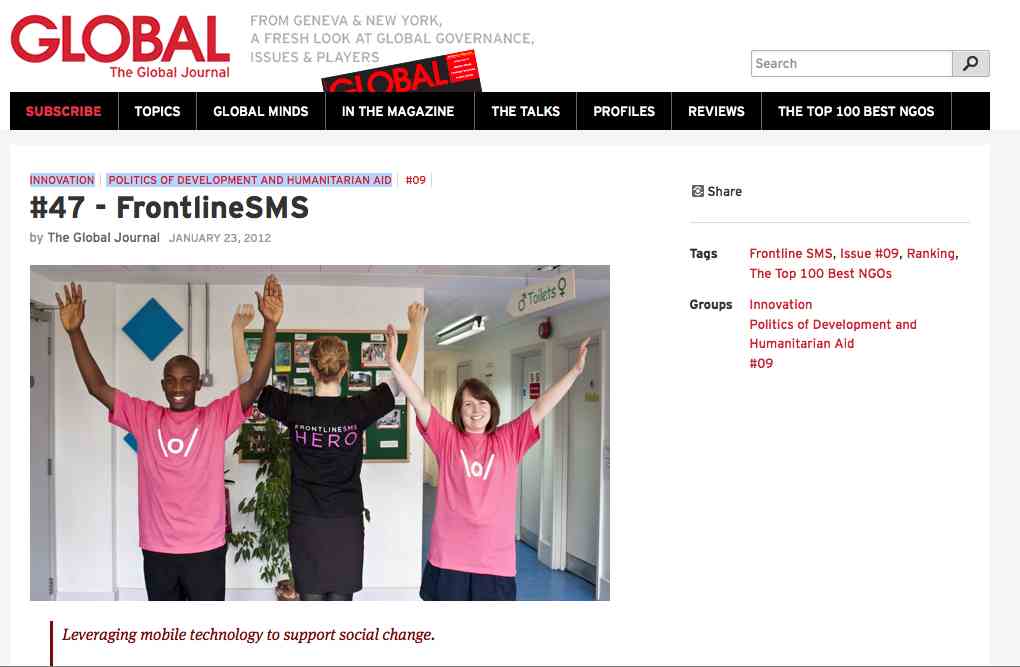 "In 2005, Ken Banks [FrontlineSMS Founder] was working to help authorities engage and communicate with the public on wildlife conservation efforts in South Africa without relying on the Internet. Realizing he needed a system that could send, receive, and organize SMS text messages through a mobile device and laptop, the original concept of FrontlineSMS was born.
"In 2005, Ken Banks [FrontlineSMS Founder] was working to help authorities engage and communicate with the public on wildlife conservation efforts in South Africa without relying on the Internet. Realizing he needed a system that could send, receive, and organize SMS text messages through a mobile device and laptop, the original concept of FrontlineSMS was born.





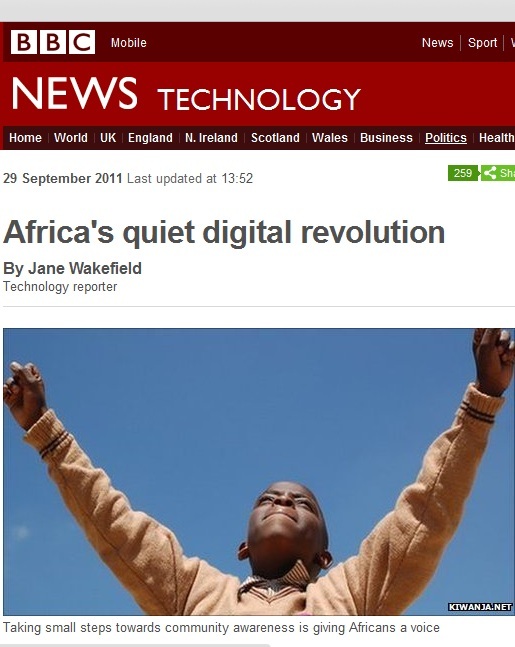


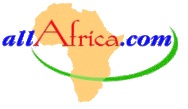
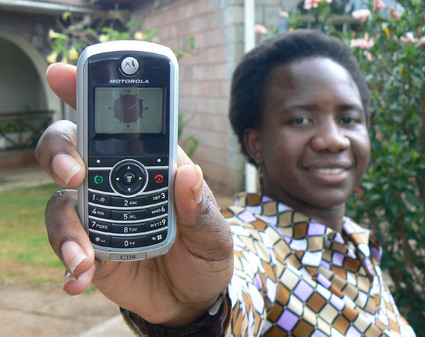



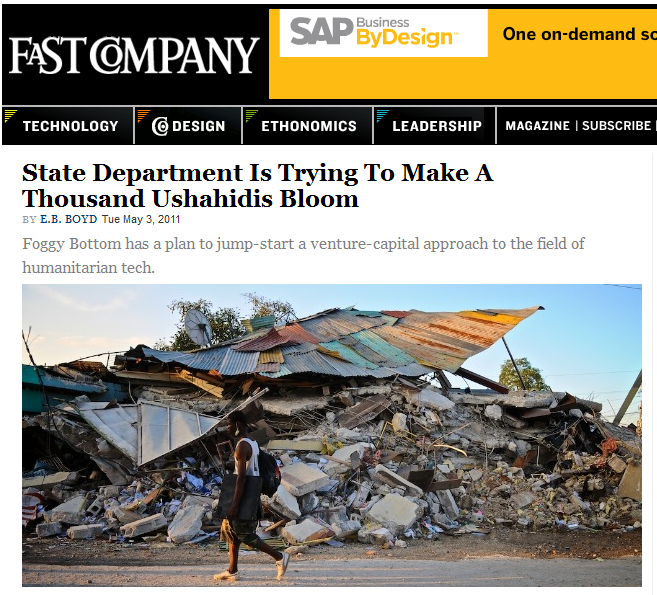 By E.B. Boyd, re-posted from
By E.B. Boyd, re-posted from 

